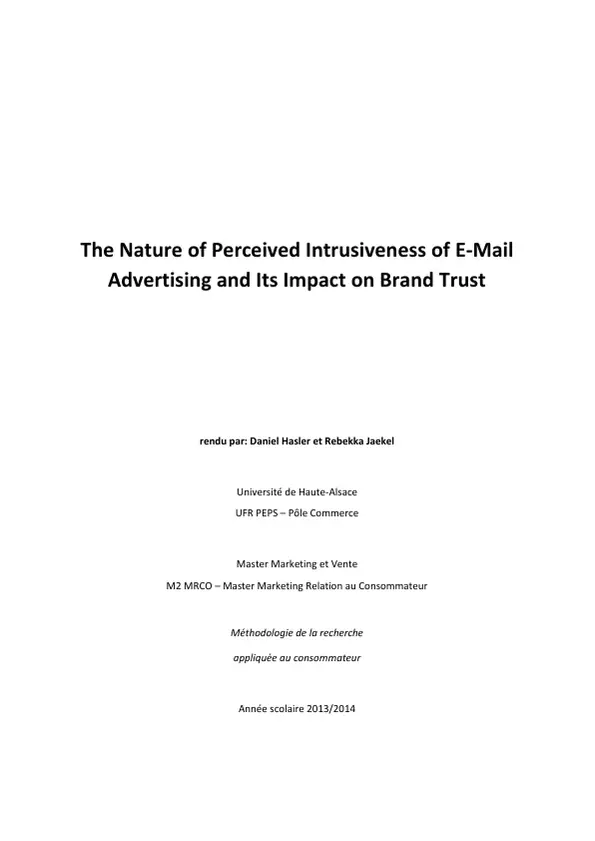E-mail advertising has become increasingly important as marketing tool for companies as it reaches a large number of customers at relatively low costs. However, there also exist certain drawbacks of this marketing tool, notably the perceived intrusiveness by the customers linked to the e-mail advertising behavior of firms. A high degree of perceived intrusiveness risks causing negative customer responses that, in the long term, may have a negative impact on brand trust. As there is barely any research on the topic of intrusive brands, this qualitative study examines the concept of intrusiveness in case of e-mail advertising for the German market more in detail. The findings explain what kind of behavior customers perceive as intrusive; hence it helps firms to understand the problem and to adapt their e-mail advertising strategies.
Inhaltsverzeichnis (Table of Contents)
- Abstract
- 1. Introduction
- 2. Literature review and hypothesized effects
- 3. Methodology
- 4. Findings
- 5. Conclusion and Managerial implications
- 6. Limitations and future research
- 7. References
- 8. Appendix
Zielsetzung und Themenschwerpunkte (Objectives and Key Themes)
This qualitative study aims to investigate the perceived intrusiveness of e-mail advertising in the German market, specifically focusing on the dimensions of intrusive behavior and its relationship with brand trust. The objective is to understand how customers perceive intrusiveness in e-mail advertising, enabling companies to adapt their strategies and maintain positive brand relationships.
- The nature of perceived intrusiveness in e-mail advertising.
- The impact of personalization, past experiences, and frequency of e-mails on perceived intrusiveness.
- The relationship between perceived intrusiveness and brand trust.
- The influence of brand familiarity and perceived advertising pressure on brand trust.
- The potential negative impact of intrusive behavior on customer responses and brand trust.
Zusammenfassung der Kapitel (Chapter Summaries)
- Introduction: The introduction highlights the increasing importance of e-mail advertising as a marketing tool for companies in Germany, despite concerns about perceived intrusiveness. The study addresses the lack of empirical research on e-mail intrusiveness and aims to provide a deeper understanding of this phenomenon.
- Literature review and hypothesized effects: This chapter reviews relevant literature on perceived ad intrusiveness, focusing on studies related to online and offline marketing tools. It outlines hypotheses based on existing theories, examining factors like personalization, past experiences, frequency, and relevance of e-mail content in relation to perceived intrusiveness. The chapter also explores the potential moderating effect of brand trust on perceived intrusiveness.
- Methodology: This section details the research methodology used in the study, including data collection techniques, participant selection, and data analysis methods. It provides a comprehensive overview of the research process.
- Findings: This chapter presents the key findings of the study, examining the dimensions of intrusive behavior, the relationship between perceived intrusiveness and brand trust, and the influence of factors like personalization, frequency, and relevance on customer perceptions. The findings provide valuable insights for companies seeking to optimize their e-mail advertising strategies.
Schlüsselwörter (Keywords)
The study explores the central themes of perceived intrusiveness, e-mail advertising, brand trust, personalization, frequency, relevance, customer response, and brand relationship in the context of the German market. The research investigates the interplay of these concepts, revealing how customers perceive intrusive behavior and its impact on brand trust.
What is perceived intrusiveness in e-mail advertising?
It refers to the customer's perception that an advertisement interferes with their goals or invades their privacy, often leading to negative feelings.
How does e-mail frequency affect brand trust?
Sending too many e-mails increases perceived intrusiveness, which can significantly damage long-term brand trust and customer relationships.
Does personalization reduce the feeling of intrusiveness?
The study examines if relevant, personalized content can mitigate negative responses, though excessive personalization might also trigger privacy concerns.
What are the findings for the German market?
The research explains specific behaviors that German customers find intrusive, helping firms adapt their local e-mail marketing strategies.
What is "advertising pressure"?
It is the cumulative effect of frequent marketing messages that makes a consumer feel overwhelmed, negatively impacting their trust in the brand.



